Building a High-end Maritime Science and Technology Innovation Platform and Showcasing the Achievements of Intelligent Shipping
——World Conference on Maritime Science and Technology 2023 Held in Qingdao

From October 17th to 19th, the World Conference on Maritime Science and Technology 2023 was held in Qingdao, Shandong Province, with the theme of “Intelligent Shipping Technology and Development Trends”. Fu Xuyin, member of the party group and vice minister of the Ministry of Transport, attended the event and delivered a speech. He Jianzhong, President of CIN, presided over the opening ceremony.

He Jianzhong, President of CIN
Fan Bo, a member of the leading Party members group and vice-governor of Shandong; Ling Wen, an academician of the Chinese Academy of Engineering and chairman of Shandong Association for Science and Technology, and Krzysztof Czaplewski, President of the International Association of Institutes of Navigation (IAIN), attended the conference and delivered speeches. Xu Zuyuan, Director high-level expert commission of the China Institute of Navigation (CIN) and former Vice Minister of the Ministry of Transport, attended the conference.
This conference was jointly hosted by the China Institute of Navigation (CIN), China Centre for International Science and Technology Exchange (CISTE), Shandong Association for Science&Technology, China COSCO Shipping Cooperation Limited and Shandong Port Group Co., Ltd..
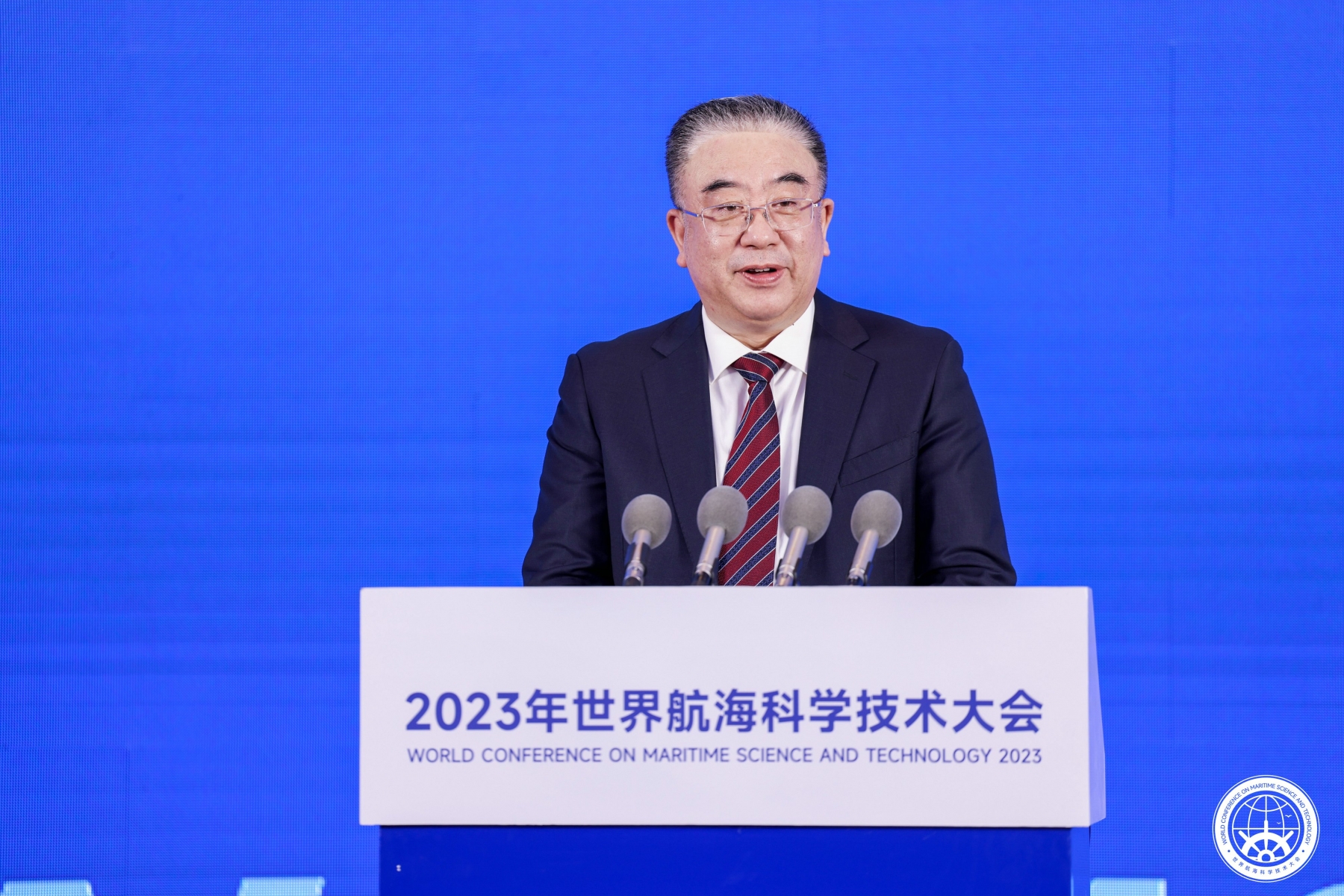
Fu Suyin, member of the party group and vice minister of the Ministry of Transport
Create a favorable environment for the development of intelligent shipping
Fu Xuyin stated in his speech that in recent years, the Ministry of Transport has accelerated the digital transformation of shipping, promoted the application of intelligent shipping technology, and continuously forged new driving forces for and strengths of shipping development. At present, the scale of China's automated container terminals ranks first in the world; the digital and intelligent transformation of inland waterway operation monitoring and joint scheduling of cascading ship locks are progressing rapidly; the shipping service network based on the blockchain continues to expand, and the first autonomous containership has already begun sailing operationally. China is at the global forefront of intelligent shipping development and applications.
Looking ahead, Fu Xuyin stressed that, we should follow the trend of the times, make full use of the advantages of the shipping industry's long supply chain, diverse related entities, and rich technological application scenarios, adhere to the innovation-driven development, strengthen the scientific and technological empowerment, promote the high-quality development of the shipping industry, and strive to a frontier in China’s modernization drive.
It is necessary to strengthen systematic planning and create a favorable environment for the development of intelligent shipping. We should actively promote the integration and application of new-generation information technology such as blockchain, Internet of Things (IoT), big data in the shipping field, and accelerate the empowerment and upgrading of traditional shipping business. He also highlighted that we should aim at the frontier science and technology of global intelligent shipping, call for efforts to achieve breakthroughs. We should focus on the formulation of regulations, standards and norms, take faster steps to improve the policy system for the development of intelligent shipping, and strive to achieve major breakthroughs and commercial application of forward-looking, pioneering and original achievements.
Fu Xuyin further stressed that we should adhere to the innovation-driven development, promote the deep integration of high-tech with shipping elements; coordinate the development of smart ports, smart waterways and smart ships, advance the construction of automated container terminals (ACT) and automation transformation of traditional container terminals into automated ones, strengthen the intelligent monitoring of waterway operation, and strive to make major breakthroughs in ship environment perception, intelligent navigation and ship-shore communication; actively build a blockchain-based shipping service network, promote the formulation of international standards for electronic bills of lading, and enhance the overall digitalization of all elements and stages of shipping services.
It is imperative to deepen exchanges and cooperation and to promote the mutual prosperity of the global shipping industry. By leveraging the roles of platforms like North Bund Forum and China Maritime Forum, we will deepen business collaboration and technical exchanges. More efforts will also be made to foster an open, cooperative and sound environment for synergistic innovation so as to emphasize joint efforts, technical sharing, and experience exchange in areas such as vessels, ports, and waterways. By doing so, we aim to facilitate collective development and progress.
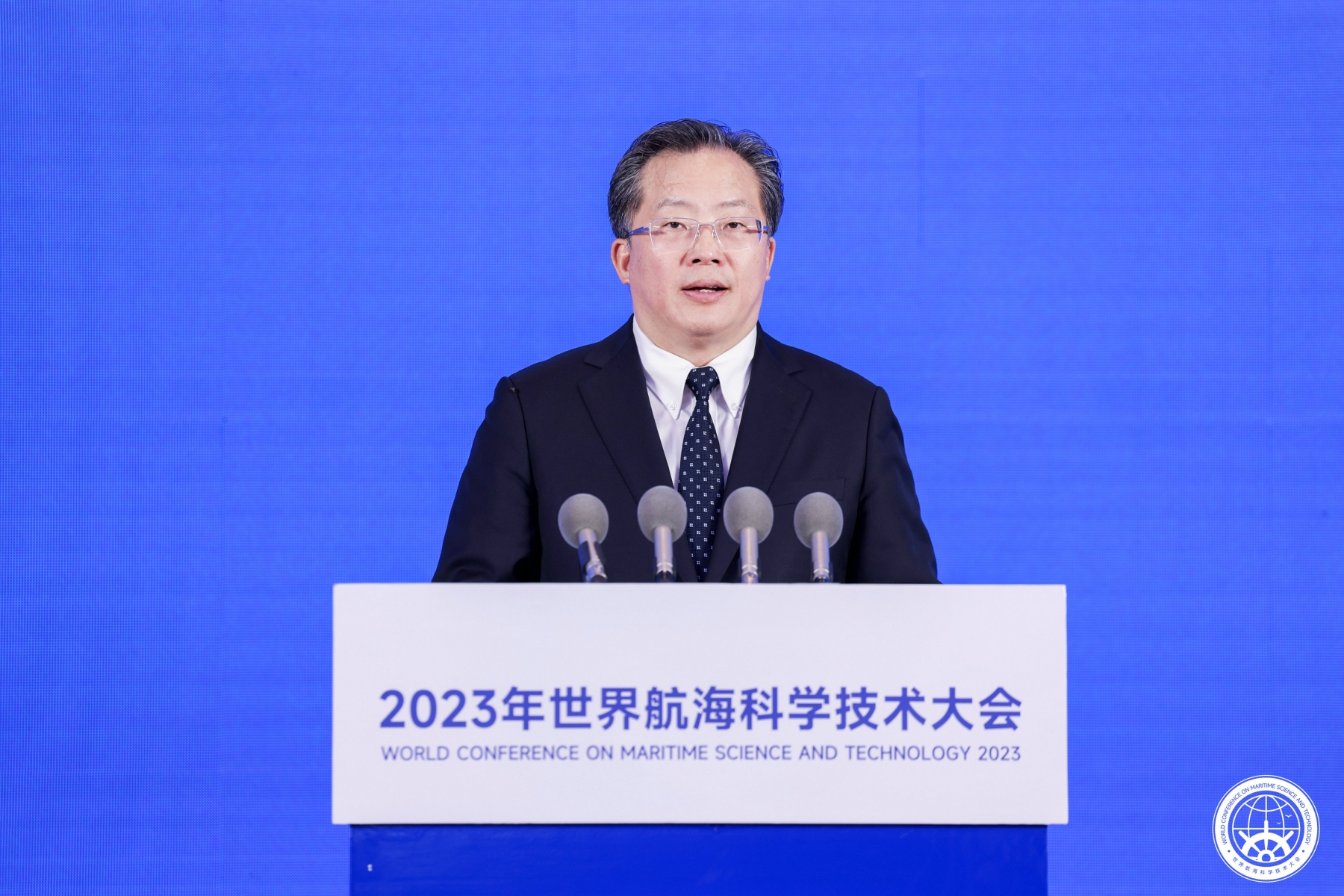
Fan Bo, a member of the Leading Party Member Group and Vice Governor of Shandong Province
Promoting Win-Win Sharing and Results in Smart Shipping
As a major transportation and shipping province, Shandong aims to build a world-class port cluster and establish a new pivot for East Asian shipping, said Fan Bo in his speech. Shandong aspires to create a top-notch ocean shipping fleet, weave a globally extensive network of shipping routes, and focus on developing smart shipping while actively promoting new maritime technologies. The conference, centered around smart shipping, autonomous vessels, and smart ports, is expected to effectively gather the wisdom and strength of governments, enterprises, and research institutions. This collaboration aims to drive breakthroughs in the development of maritime science and technology, continually shape new dynamics and advantages for shipping development, and inject powerful momentum into the construction of Shandong as a maritime powerhouse.
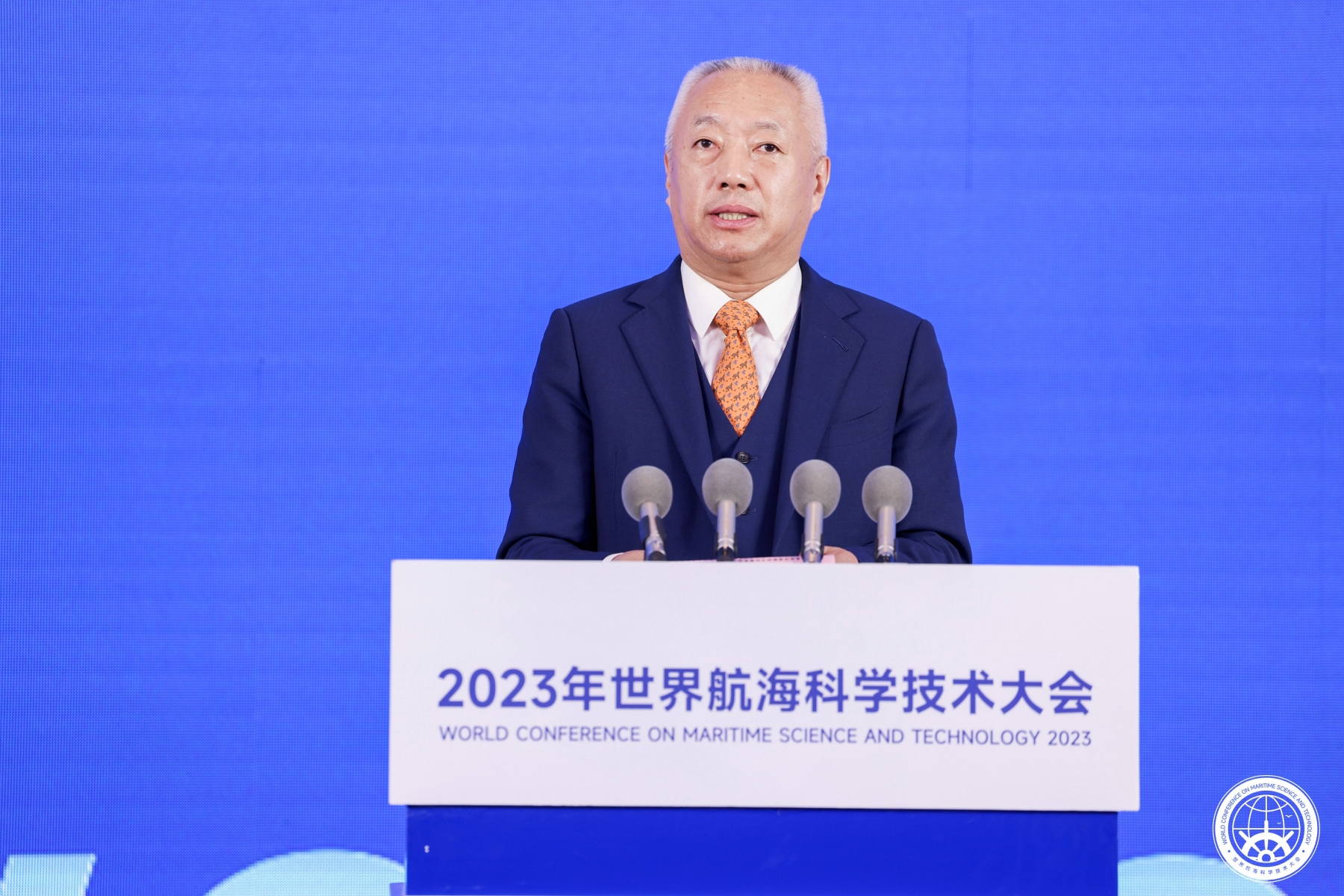
Ling Wen, an academician of the CAE, Chairman of the Shandong Association for Science & Technology
Ling Wen stated that Shandong Province possesses a profound technological foundation and extensive industrial application scenarios, with Qingdao boasting unique advantages in marine resources and research. Shandong Association for Science & Technology adheres to its responsibilities of serving scientists, driving innovation, enhancing scientific literacy of the whole nation, and supporting scientific decision-making for the Party and the government. Actively establishing international platforms for academic and technological exchange and cooperation, we strive to forge a new pattern of cooperation in science and technology, contributing to the development of an open and innovative ecosystem.
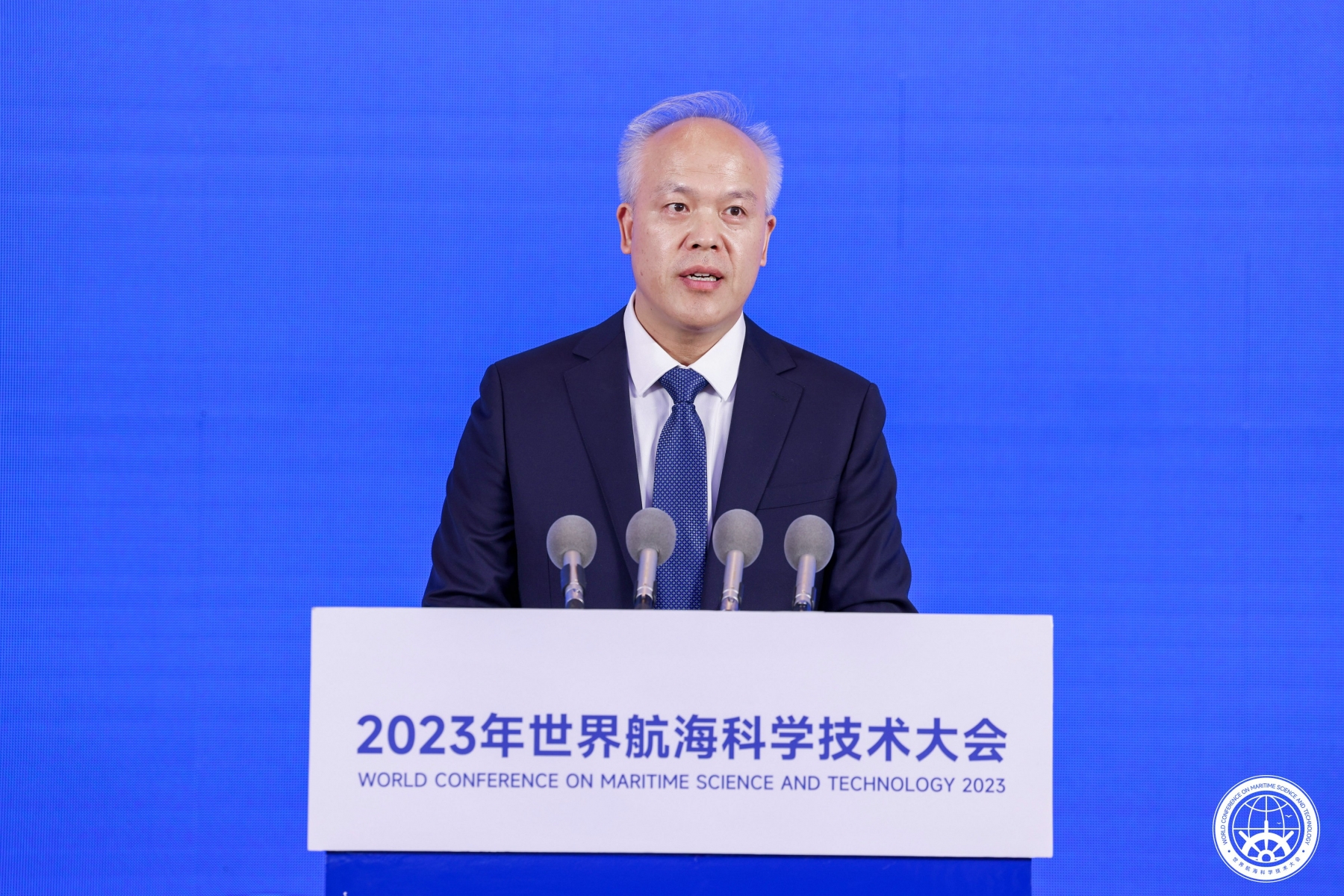
Su Xiaojun, Director of China Centre for International Science and Technology Exchange
Su Xiaojun, Director of China Centre for International Science and Technology Exchange, highlighted the importance of smart shipping as a crucial field for innovative development, and its significance in enhancing the core competitiveness of China's shipping industry and serving national development. The conference, themed "Intelligent Shipping Technology and Development Trends", provides experts in the maritime field from various countries with a broad platform for exchange, fostering deep cooperation and mutual benefit in the field of smart shipping.
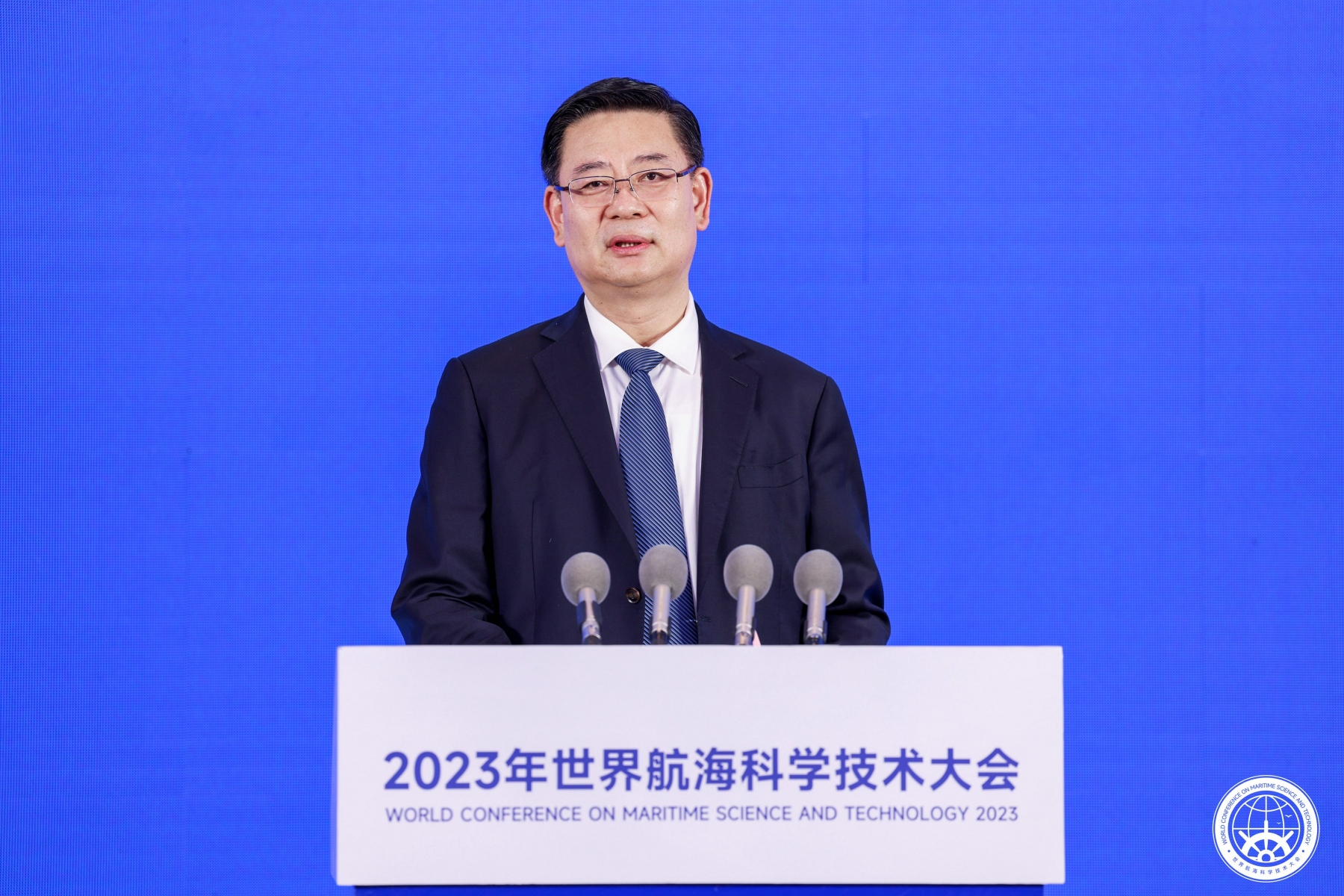
Wang Bo, Vice Mayor of Qingdao Municipal
Vice Mayor of Qingdao Municipal, Wang Bo, stated Qingdao's prominent geographical location, abundant marine resources, solid industrial foundation, and evident openness, provide a strong foundation for developing the smart shipping industry. With coordinated planning and scientific guidance from ministries such as the Ministry of Transport of the People’s Republic of China, Qingdao has collaborated with China Waterborne Transport Research Institute to establish the Qingdao Shipping Development Research Institute. Breakthroughs in key technologies have been achieved, leading to the construction of the nation's first autonomous sailing vessel-"ZhiTeng", and the first autonomous container ship-"ZhiFei", and was approved as the country's first national-level intelligent shipping sea trial field, propelling advancements in a high-quality smart shipping system. Seizing the opportunity of the conference, Qingdao aims to deepen practical cooperation with various parties, vigorously support the development of the smart shipping industry, comprehensively enhance new strengths for maritime development, and contribute significantly to the construction of a transportation and maritime power.
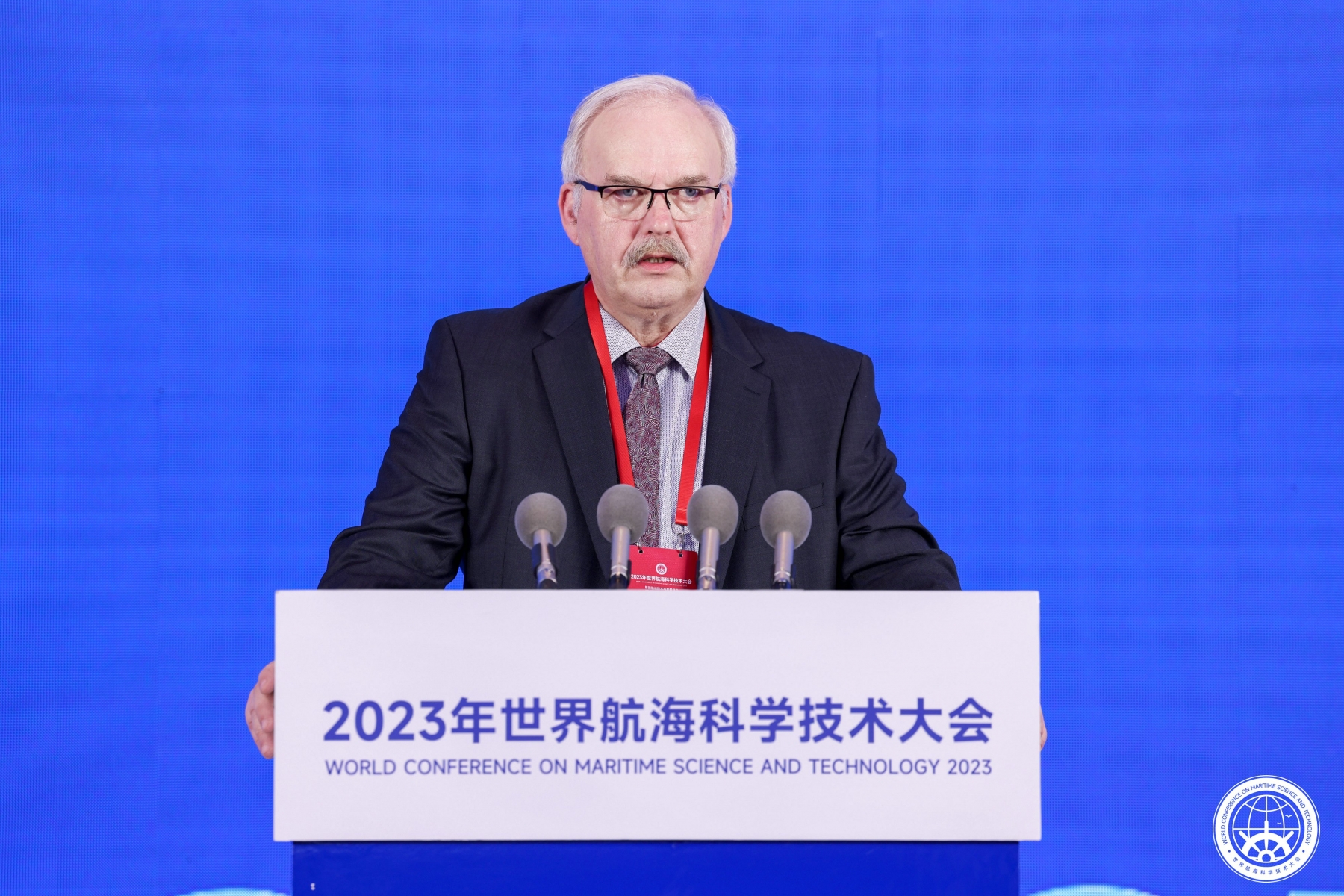
Krzysztof Czaplewski, President of the International Association of Institutes of Navigation (IAIN)
Krzysztof Czaplewski, President of the International Association of Institutes of Navigation (IAIN), expressed great pleasure at participants sharing ideas and experiences during the conference so as to promote the safe and scientific development of transportation modes. He emphasized that the conference serves as a starting point for exchanging ideas on maritime science and technology. He also hoped that attendees could continue their research efforts, strengthen technological innovation, and further enhance the quality and standards of maritime transport services all over the world.
Charting the Future Development Path of Intelligent Shipping
The conference invited domestic and foreign academicians and experts to deliver keynote speeches on new technologies and concepts related to the development of intelligent shipping.
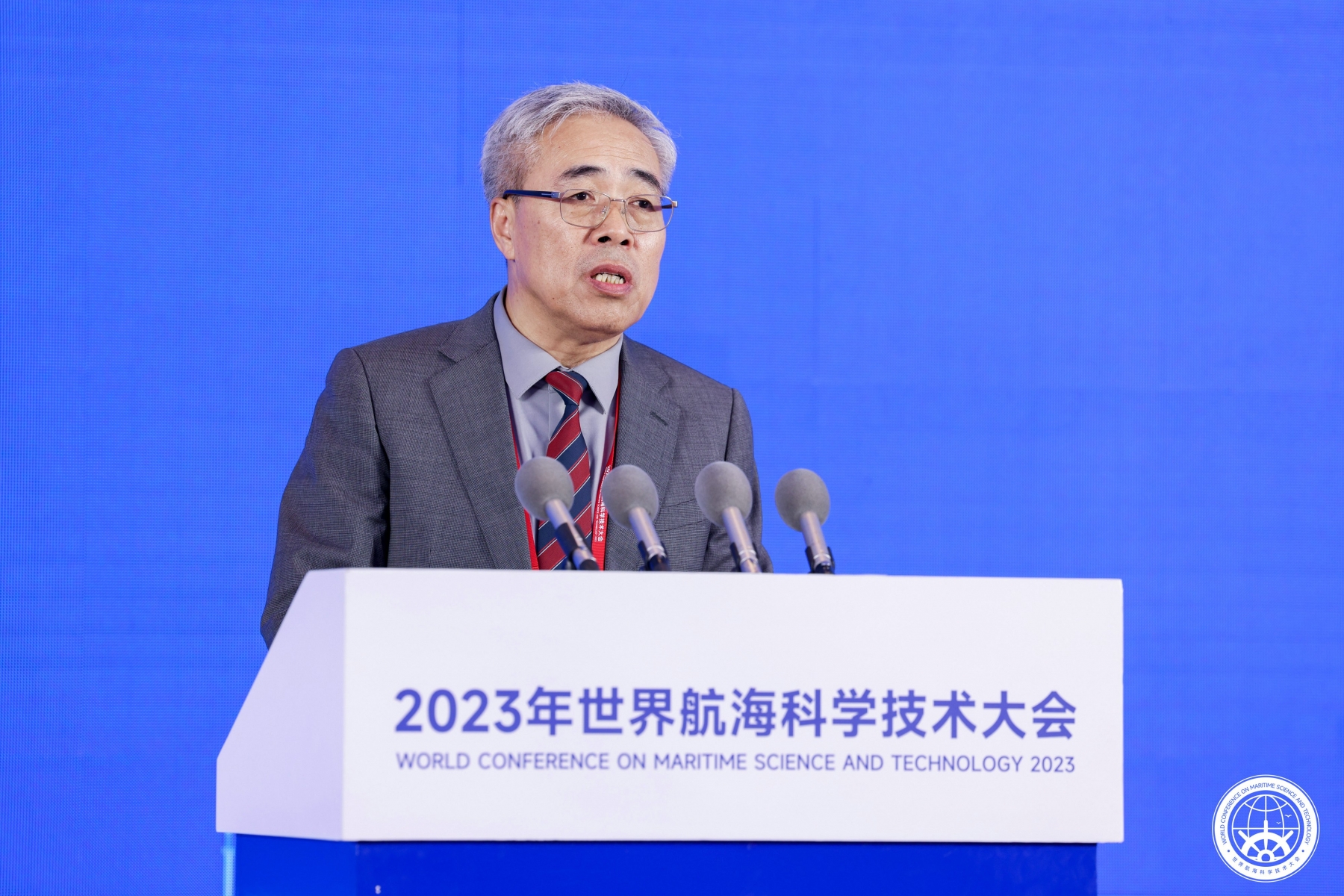
Zhang Baochen, Executive Vice Chairman of the China Institute of Navigation (CIN)
Zhang Baochen, Executive Vice Chairman of the China Institute of Navigation (CIN), stated that China has strengthened the research and application of smart shipping technology, yielding results in areas such as smart ports, intelligent waterways and maritime safety, and digitized shipping services. Analyzing the development progress of smart shipping, Zhang noted that due to varying degrees of independence and correlation among different elements, the pace of its development does not require strict uniformity. Regarding the forecast and outlook for China's smart shipping development, Zhang projected that by 2025, technology and industrialization would generally reach international advanced levels. Smart navigation regulations would be mostly completed, and assisted driving technology would see large-scale application, with remote and autonomous driving technology with people on board diversely implemented. By 2035, technology and industrialization would generally lead internationally, fundamentally forming new forms of intelligent shipping. Coastal remote and autonomous vessels would constitute over 30%. By 2050, comprehensive international leadership in technology and industrialization would be achieved, establishing a high-quality intelligent shipping system with globally covered, networked, and intelligent maritime services.
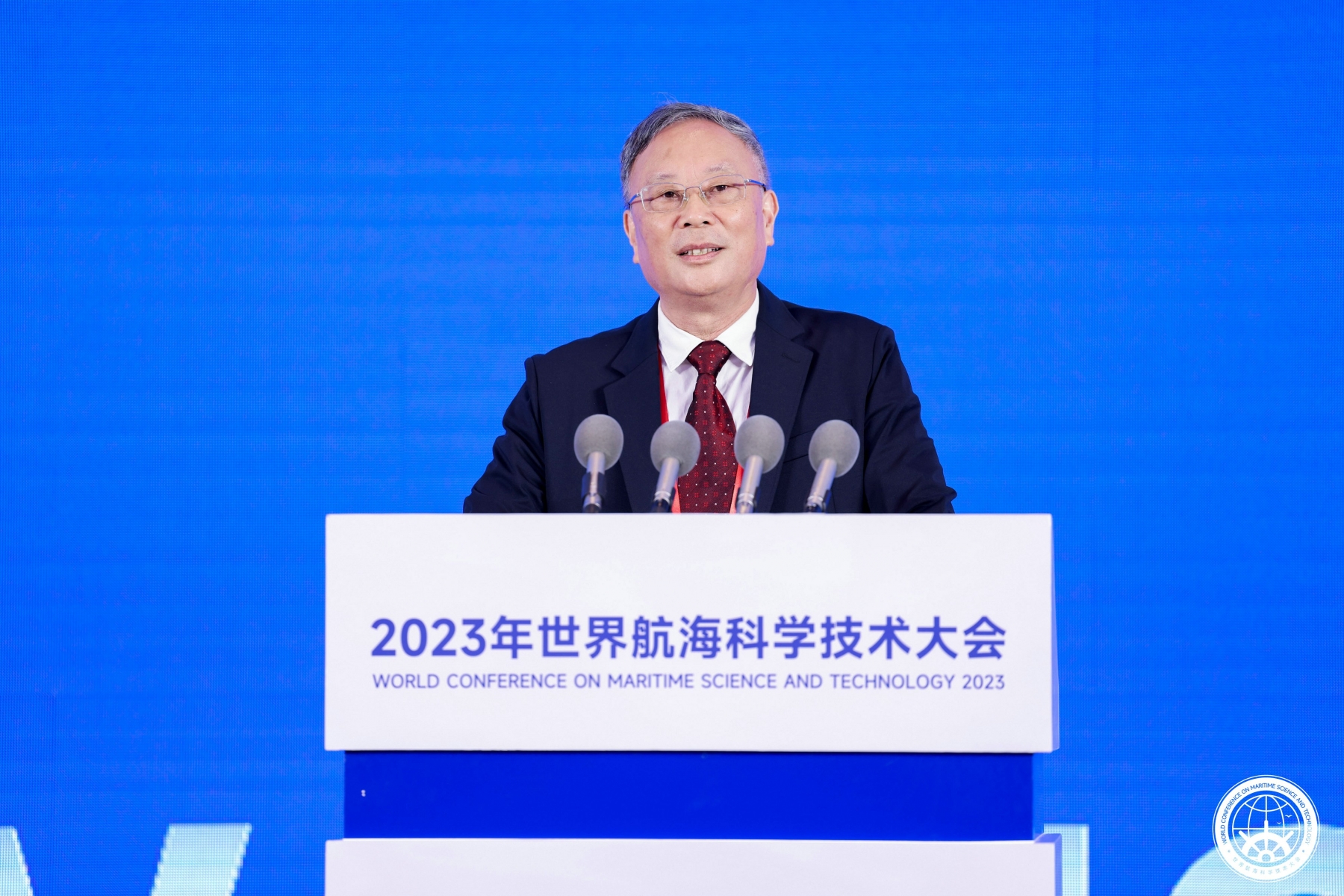
Yan Xinping, an academician of the CAE, Chief Professor of Wuhan University of Technology
The Maritime Three-dimensional Transportation System consists of a novel three-dimensional integrated transportation system encompassing maritime surface, underwater, and subsea-to-surface transport systems. An academician of the CAE and Chief Professor of Wuhan University of Technology, Yan Xinping, highlighted the key technologies for this system, which include system planning and design, intelligent operational control, green energy supply, and efficient organizational management. With the increasing focus on ocean development and activities, the design and construction of the Maritime Three-dimensional Transportation System need urgent attention. Its development requires progress in technical systems, equipment spectra, and standard architectures. Aligning with the strategy of becoming a maritime power, it is essential to conduct crucial technical research to lead the technological development of the Maritime Three-dimensional Transportation System.
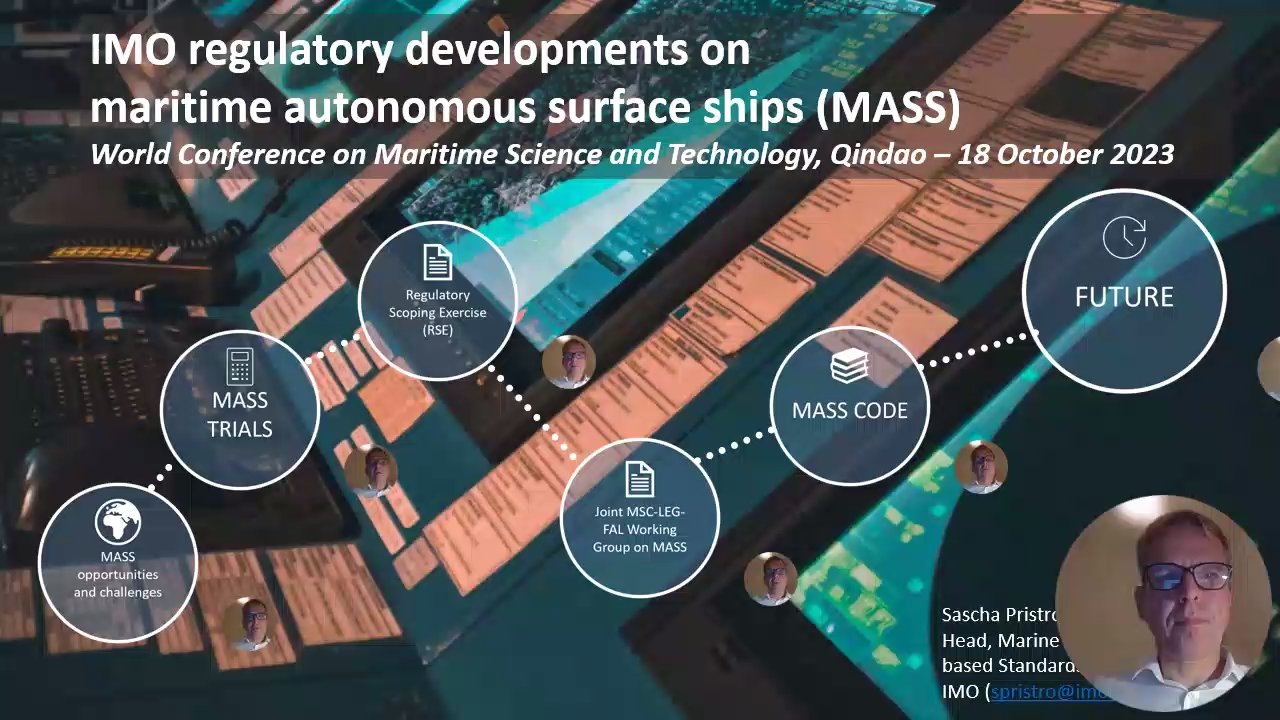
Sascha Pristrom, Officer of IMO's Maritime Safety Division
Sascha Pristrom, an officer in IMO's Maritime Safety Division, highlighted the potential of Maritime Autonomous Surface Ships (MASS) in reducing human-induced operational errors, enabling swift deployment in emergency situations, and lowering potential costs. Simultaneously, MASS also presents both opportunities and challenges for regulation. There is a need to adjust and refine the legal framework for maritime navigation safety, balancing the issues and impacts introduced by new technologies.

Alexander Pinskiy, Chairman of Supervisory Board of Marinet from Russia
Marinet from Russia is dedicated to promoting scientific and technological innovation in marine information control and detection, underwater intelligent robots, digital navigation, marine resources development technology, shipbuilding technology and other areas. Alexander Pinskiy, Chairman of the center's supervisory board, stated Russia has completed the certification process for its first autonomous ship and will soon implement relevant laws covering various aspects of autonomous ship operations, providing a reference for the development of the global shipping industry.
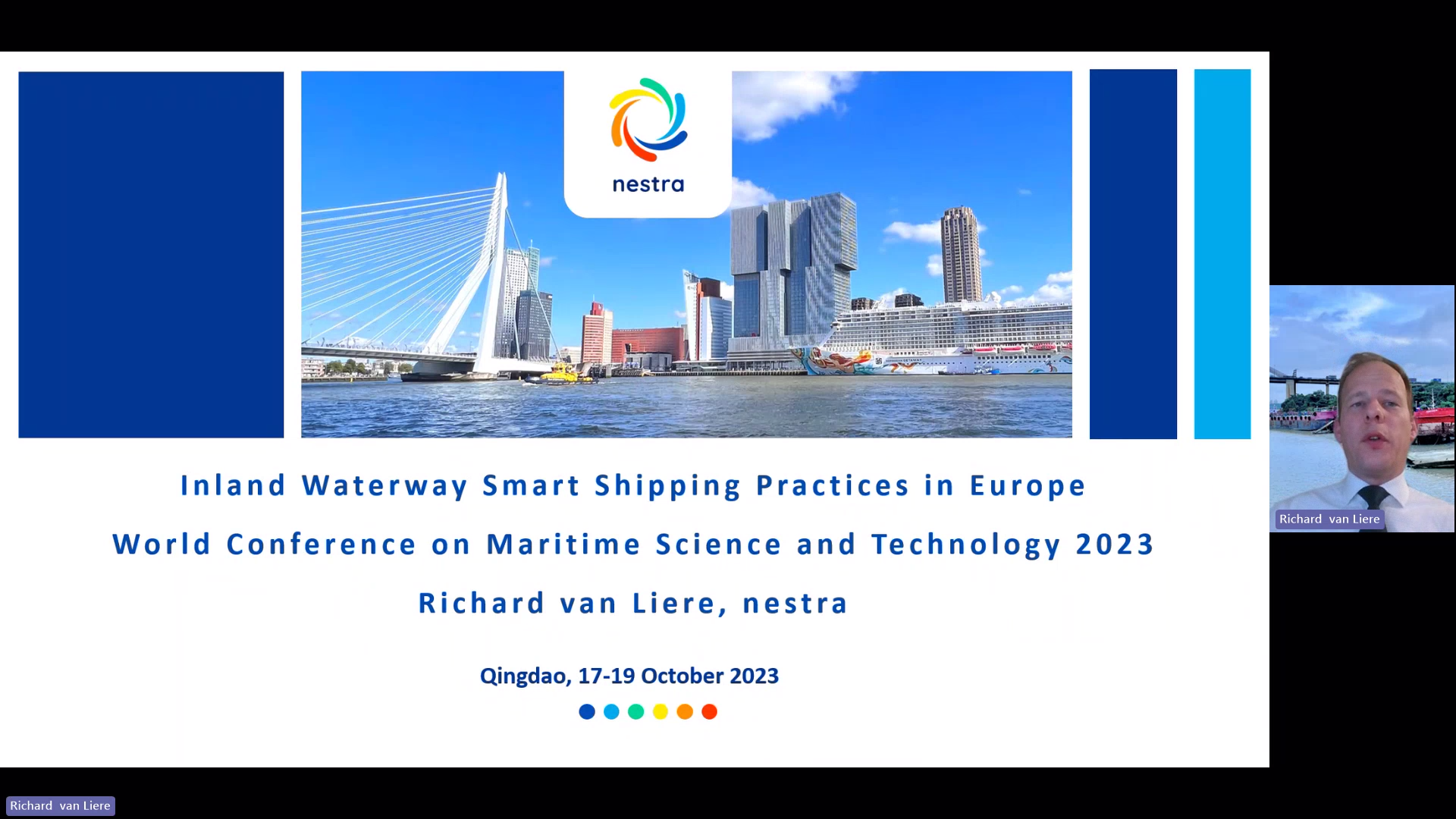
Netherlands Expert Group for Sustainable Transport and Logistics(NESTRA)
European Union member states are highly concerned about and actively support the application and practice of intelligent shipping technology in inland water transportation. The Netherlands Expert Group for Sustainable Transport & Logistics (NESTRA) is dedicated to the research on the green and sustainable development of inland waterway shipping , provides consultancy and applied research for the EU commission , the World Bank and others. At the meeting, Richard van Liere delivered a speech on Inland Waterway Smart Shipping Practices in Europe.

Carlos Guedes Soares, an academician of Portuguese Academy of Engineering
Currently, the development trend ofshipping industry is green,low carbon and intelligent. Carlos Guedes Soares, a Member of Portuguese Academy of Engineering, has participated in approximately 60 European projects and has published about 400 papers in international journals. At the Conference,gave an outlook on the development of the green and intelligent technology in the shipping industry.
Exchanging and Sharing Practical Experiences of Intelligent Shipping
As high-end equipment and an important support of smart shipping, smart ships have a significant impact on the enhancement of industrial capabilities and the development of the shipping industry.
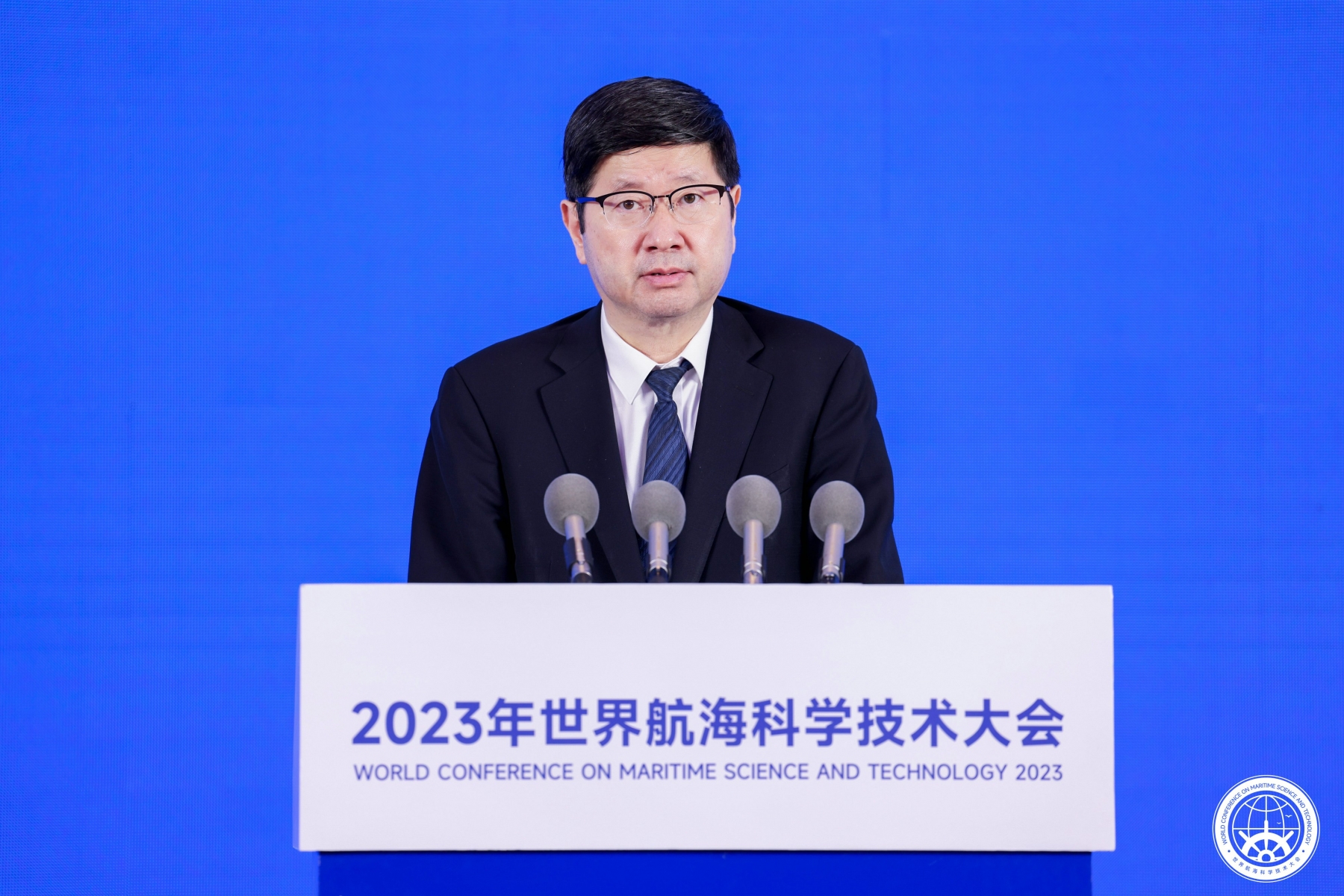
Sun Yunfei, Deputy General Manager of China COSCO SHIPPING Co., Ltd.
In 2019, the Ministry of Transport included the development and application of intelligent ships by China COSCO SHIPPING Co., Ltd. in its pilot work for the construction of a strong transportation nation. Sun Yunfei, Deputy General Manager of China COSCO SHIPPING Co., Ltd., stated that relevant work has been steadily promoted and positive results has been achieved .
In terms of the application demonstration, the intelligent system listed ships include Dalian Maritime University's training ship for navigation education, 14,000 TEU, and 16,000 TEU series container ships, 77,000-ton series multipurpose ships, and 700 TEU battery-powered ships. In terms of top-level design, the formulation of three standards has been completed, and work on the drafting of five standard drafts is currently underway. In terms of top-level design, the formulation of three standards has been completed and the formulation of five draft standards is currently underway. In terms of function development, the ship collision avoidance behaviour monitoring system has been developed, with the installation of 17 sets of 2.0 equipment completed; and the remote intelligent condition monitoring function has been developed and has begun ship-loading testing.
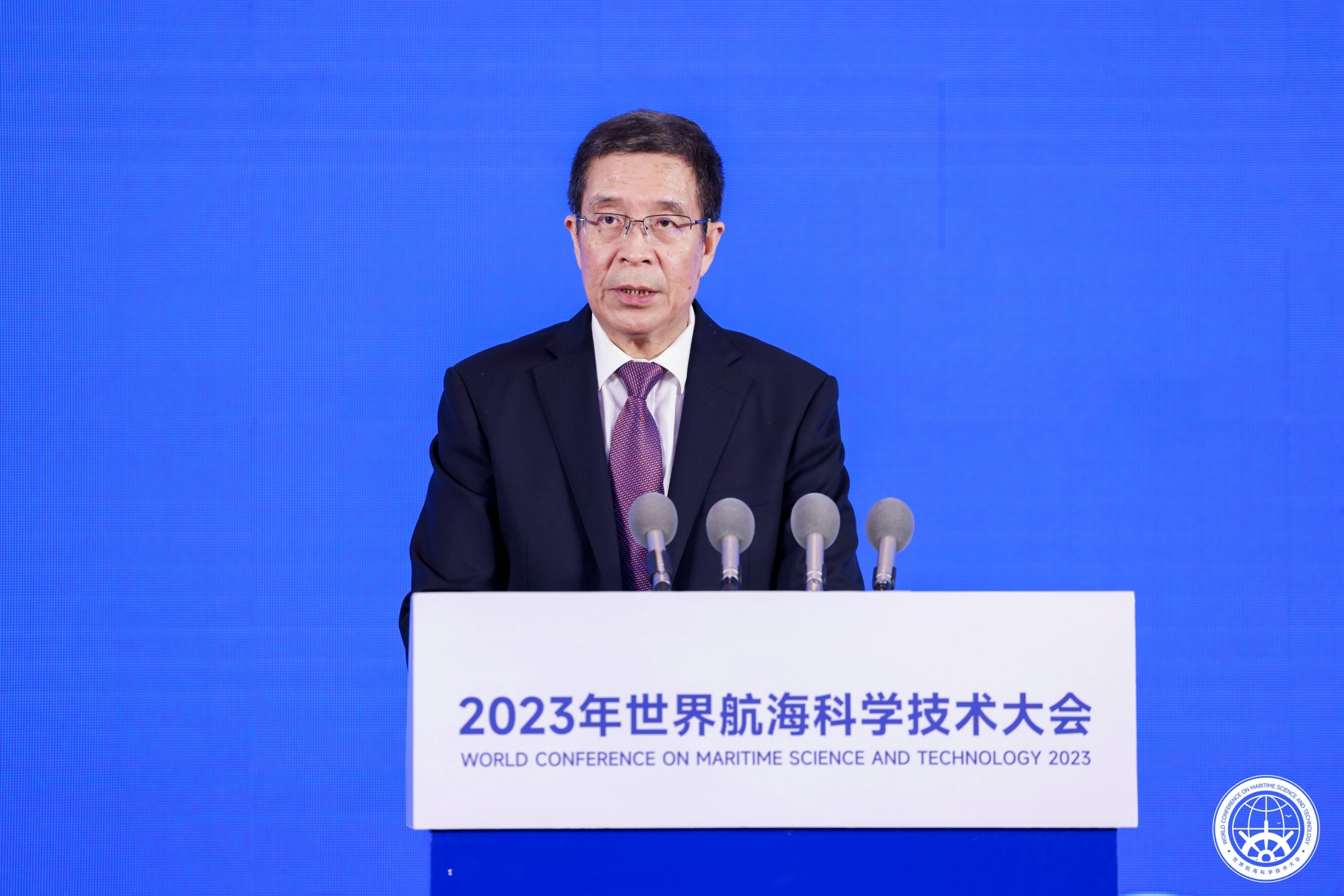
Zhang Liangang, Chief Scientist of Shandong Port Group Co., Ltd.
The Shandong PortGroup Co., Ltd.(SPG) takes building an “internationally leading smart green port” as the primary task of tits “Five Internationally leading” development strategy. We have formulated the Top-Level Design Plan Of Intelligent Green Port in Shandong Port and has laid out the development plan of green and low- ports
Zhang Liangang, Chief Scientist of Shandong Port Group Co., Ltd., said that SPG is driving innovation to transform its operations. In terms of the fully automated terminal construction, we have completed the construction of the world’s leading and Asia’s first truly automated container terminal. We have also completed the layout of an automated terminal, featuring “remote control automated shore bridge + unmanned container truck + automated rail crane”. In terms of promoting the intelligent upgrading of traditional terminals, we introduced world-first specialized terminal control technology for dry-bulk cargoes, achieved the concept of “full-system, full-process, and full-automation”. we are actively building a production management system for liquefied natural gas (LNG) terminal, a video intelligent monitoring system, and an intelligent video inspection system. The world's first self-developed automated portal crane has officially gone into dry bulk cargo operation at Bohai Bay Port. In addition, we will strengthen the construction of information infrastructure, enhance the application of clean energy in ports, build a smart brain for management decision-making, and upgrade the ecosystem of port and shipping services.
Promote the Construction of Intelligent Shipping Technology Innovation Community
On October 17, during the conferenceconference, the China Institute of Navigation (CIN) held the award ceremony for the“Intelligent Shipping Technology Innovation Community” (referred to as the Innovation Community).
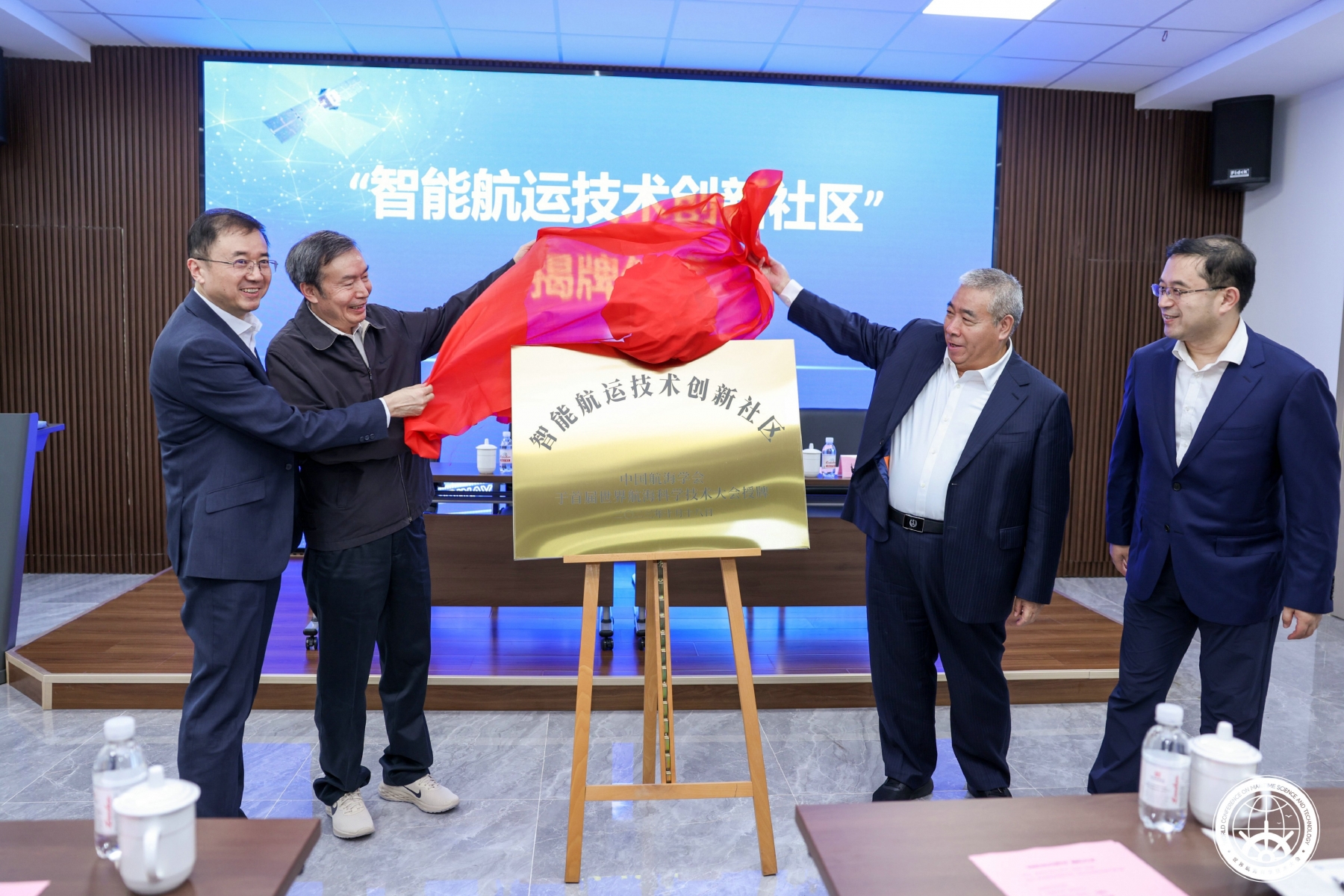
Award ceremony of the “Intelligent Shipping Technology Innovation Community ”(referred to as the Innovation Community)
The Innovation Community,, based on Qingdao Intelligent Shipping Industrial Park, in collaboration with relevant units such as the Shandong Maritime Safety Administration,China Waterborne Transport Research Institute, Shandong Port Group Co., Ltd., and the Qingdao Pilot Station. It aims to accelerate theR&D as well as practice of intelligent shipping technology, explore new mechanisms and models for gathering innovative elements of intelligent shipping, promoting communication and cooperation, and cultivating new talents. The community aims to promote technological progress in the shipping field, and create a conducive environment.
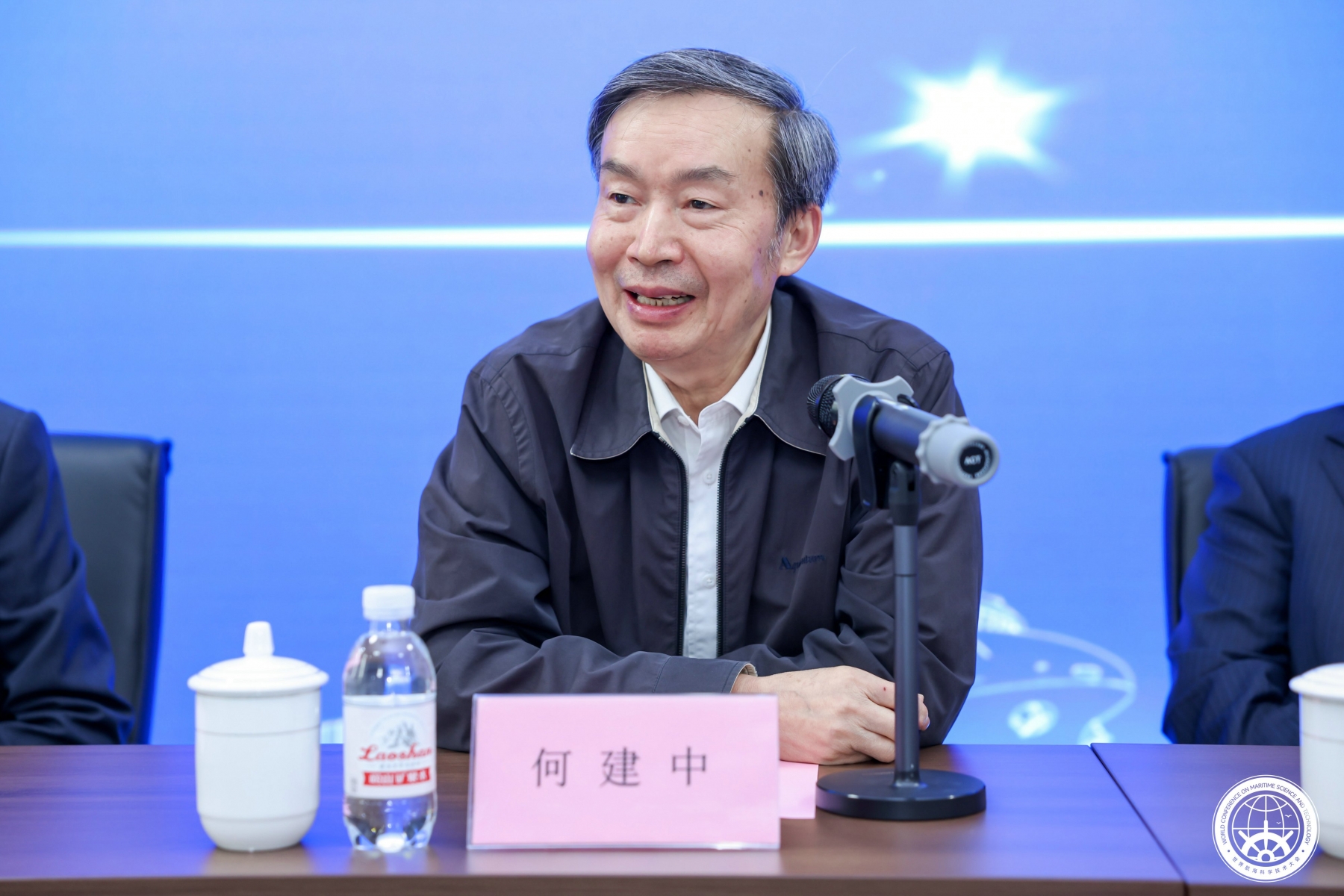
He Jianzhong, Chairman of the CIN
When it comes to the construction of the innovation community, he stressed that, first, innovative characteristics must be highlighted. The community should take the intelligent shipping technology as the core, more efforts should be made in technology R&D so as to generate new innovations. Second, collaboration and cooperation must be strengthened. The community should set up a maritime collaboration and cooperation must be strengthened. The community should set up a maritime science and technology innovation platform that integrates industry, academia, research and application. And this platform should gather innovative talents, key national laboratories, innovative technology enterprises and other scientific and technological resources, get enterprises to fully play their principal role in innovation to attract more partners;Third, boosting commercialization of research findings. The community should remote the transformation of research results into industrial development.
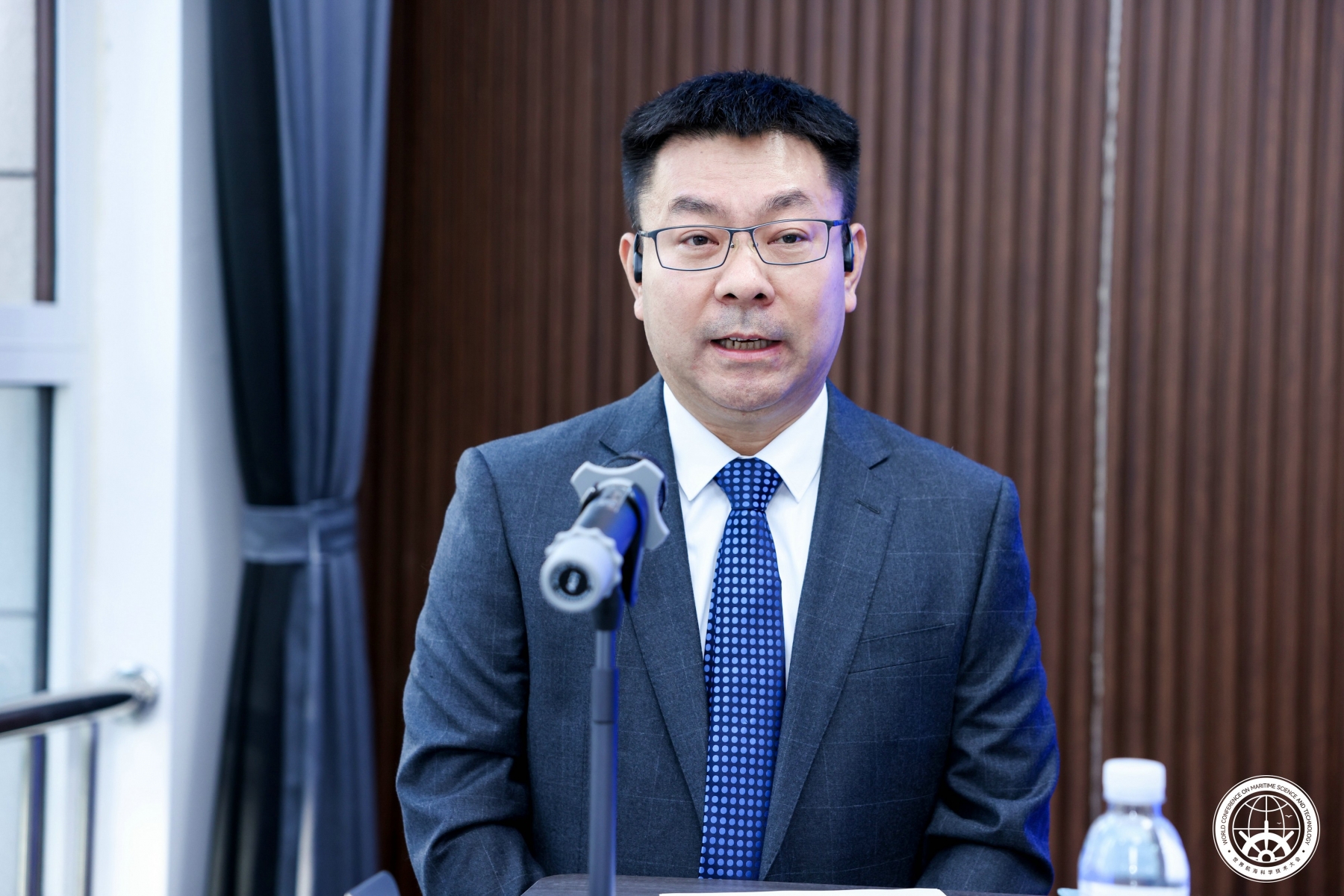
Li Yabin, the dean of the Qingdao Shipping Development Research Institute
Li Yabin, President of Qingdao Shipping Development Research Institute, explained the main activities of the Innovation Community. The community will collect and analyze industry information, accurately hasp the development trends and . The community will collect and analyze, and facilitate information sharing among member units; The community will host online or offline academic and business conferences, organize joint business inspections, and facilitate mutual visits and exchanges among member units to promote business communication and mutual improvement; The community will organize and carry out research on intelligent shipping technology, models, mechanisms, and The community will organize and carry out research on share research results to promote coordinated development. ; The community will explore ways to facilitate the industrialization of intelligent shipping achievements and incubate intelligent shipping innovative enterprises; The community will organize member units and experts with advantages to jointly apply for and implement intelligent shipping R&D and engineering projects at home and abroad; The community will Create a favorable environment for talent growth, explore mechanisms and models for intelligent shipping talents to gather, move and cooperate across regions, and providing opportunities and guarantees for intelligent shipping talents to carry out technological innovations. The community will implement an open membership system, where anyone interested in cooperation can apply to join.
Jointly Promoting the Belt and Road International Port and Shipping Sci-Tech Cooperation
In order to further deepen sic-tech exchanges and cooperation in the field of international port and shipping under the Belt and Road Initiative, to guide the partnership of coordination to steady and sustained prosperity among various organizations, and to achieve high-quality and sustainable development of the industry,China Institute of Navigation (CIN) and other 20 units have issued the Proposal on Jointly Promoting the Belt and Road International Port and Shipping Sci-Tech Cooperation, which includes four key proposals.
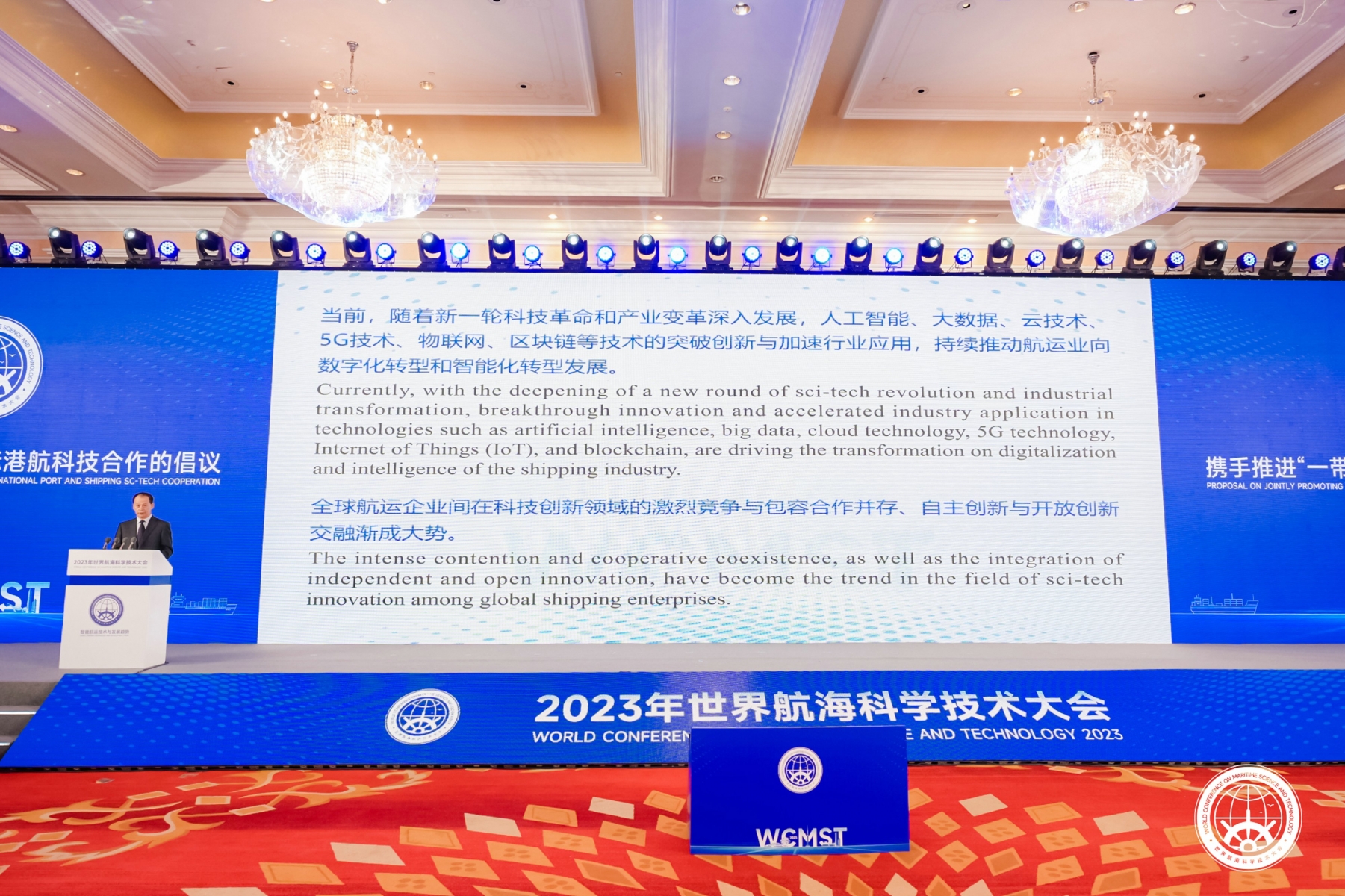
Proposal on Jointly Promoting the Belt and Road International Port and Shipping Sci-Tech Cooperation
First, proposal on shifting individual exploration to coordinated development. While adhering to independent innovation, the R&D models of port and shipping enterprises need to shift individual exploration to coordinated development. They should participate in international sci-tech innovation cooperation, integrate into the global innovation chain, make use of global innovation resources, so as to achieve the goals of reducing innovation costs and risks, and improving the efficiency and level of scientific and technological innovation.
Second, proposal on building a new ecosystem for innovation cooperation. We will promote exchanges and cooperation by establishing shared scientific and technological innovation platforms; we will deepen fundamental research cooperation, advance the deep integration of technological innovation and industrial development; we will advance cooperation to tackle issues in key projects, and strive to achieve good outcomes. Through cooperation in science technology and innovation, we will deepen close coordination among various segments of the global shipping, form a comprehensive advantage. This will facilitate resource sharing, connectivity, and support for port and shipping companies in their pursuit of innovation-driven development and transformation of growth patterns.
Thirdly, establish an international cooperation platform for port and shipping technology. Focusing on best practices in technological innovation, such a platform is initiated to set up to boost and port navigation enterprises to share their best and successful practices, leading to accelerate information transformation and cooperation and benefit more port navigation enterprises from successful experiences.
Fourthly, promote the intelligent development in a green and low-carbon way. Realizing carbon neutralization is the integral responsibility for port navigation enterprises to advance protection and development in parallel. Besides, intelligent development and digital transformation are two significant measures for the shipping industry to improve the competitiveness and adapt to the changes of market changes.
All relevant units in the field of ports and shipping should support and advocate the application of clean energy, energy-saving technologies, environmental protection measures and others, with the purpose of reducing carbon emission and the impacts on environment. To this end, smart ports, channels, ships should be prompted to keep creating new momentums and advantages of shipping industry, all together realizing the intelligent development in a green and low-carbon way.
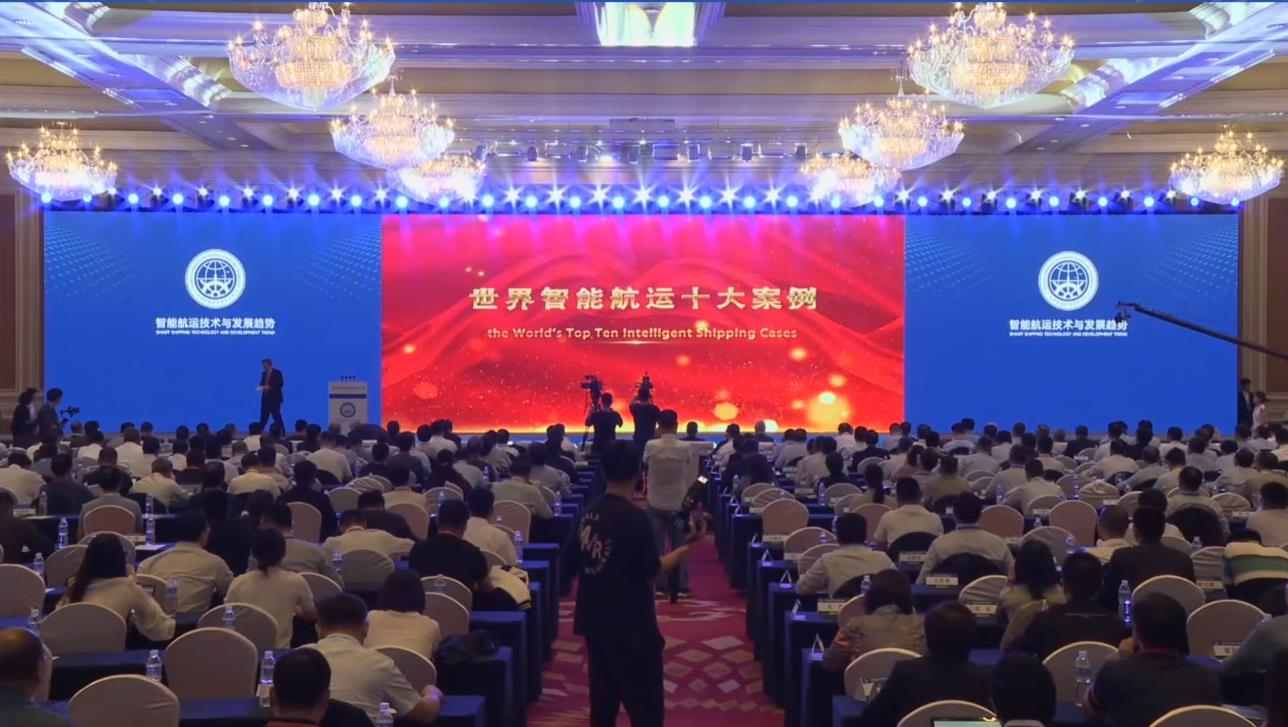
Ten cases of world smart shipping
Ten cases of world smart shipping were also presented in the Convention. To be specific, they are MASS CODE roadmap approved by IMO, standard of smart shipping set by ISO, Yara Birkeland, Norwegian autonomous container ship, Russian Autonomous and Remote Navigation Trial Project (ARNTP), Japanese MEGURI2040 Project, Guidance on Smart Shipping Development released by China, China key technical research projects on intelligent navigation and control, the smart shipping development roadmap formulated by Holland, full automated and intelligentization transformation of ports in China, and Korean very large LNG autonomous ship Prism Courage.
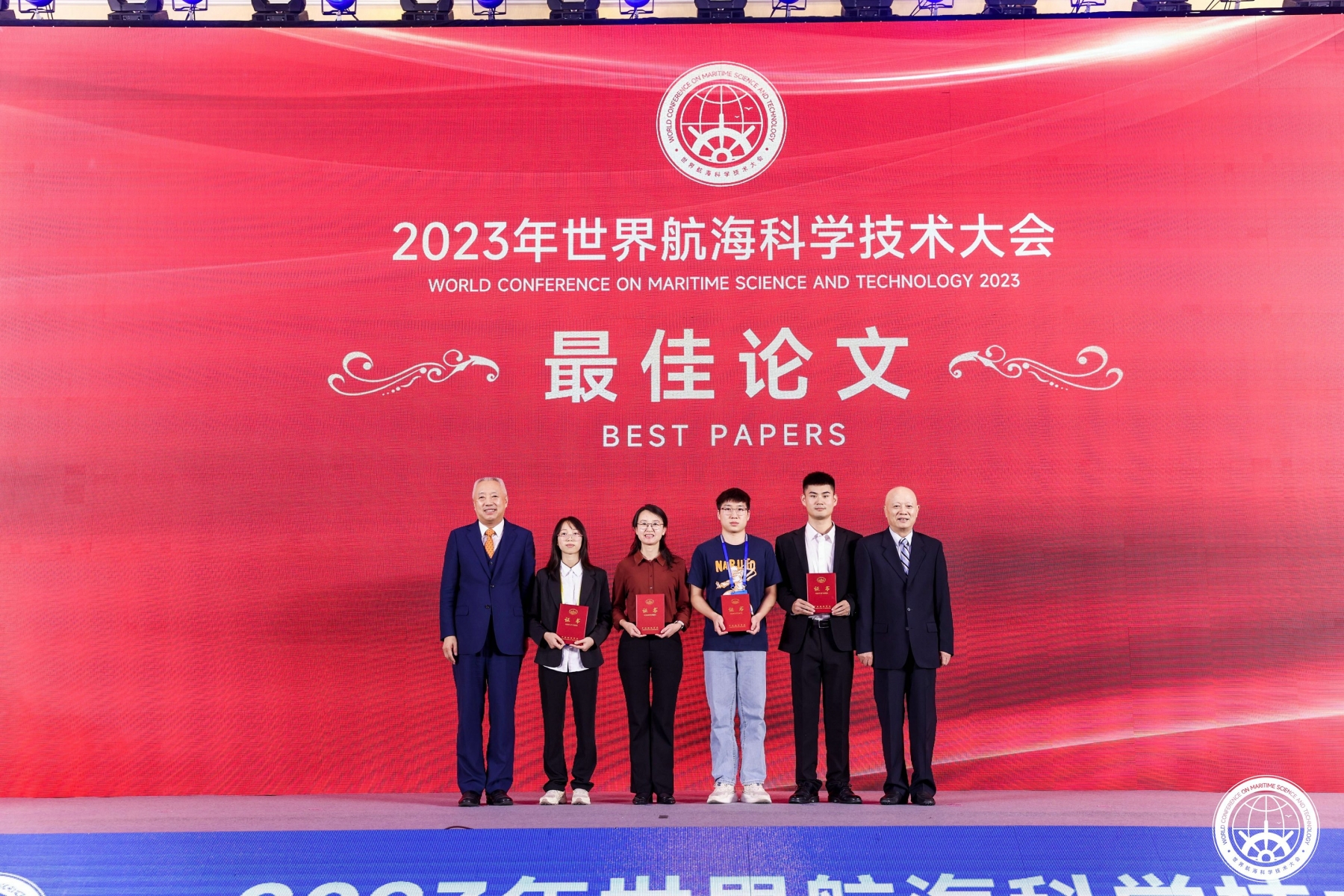
Issue the certificates of best paper
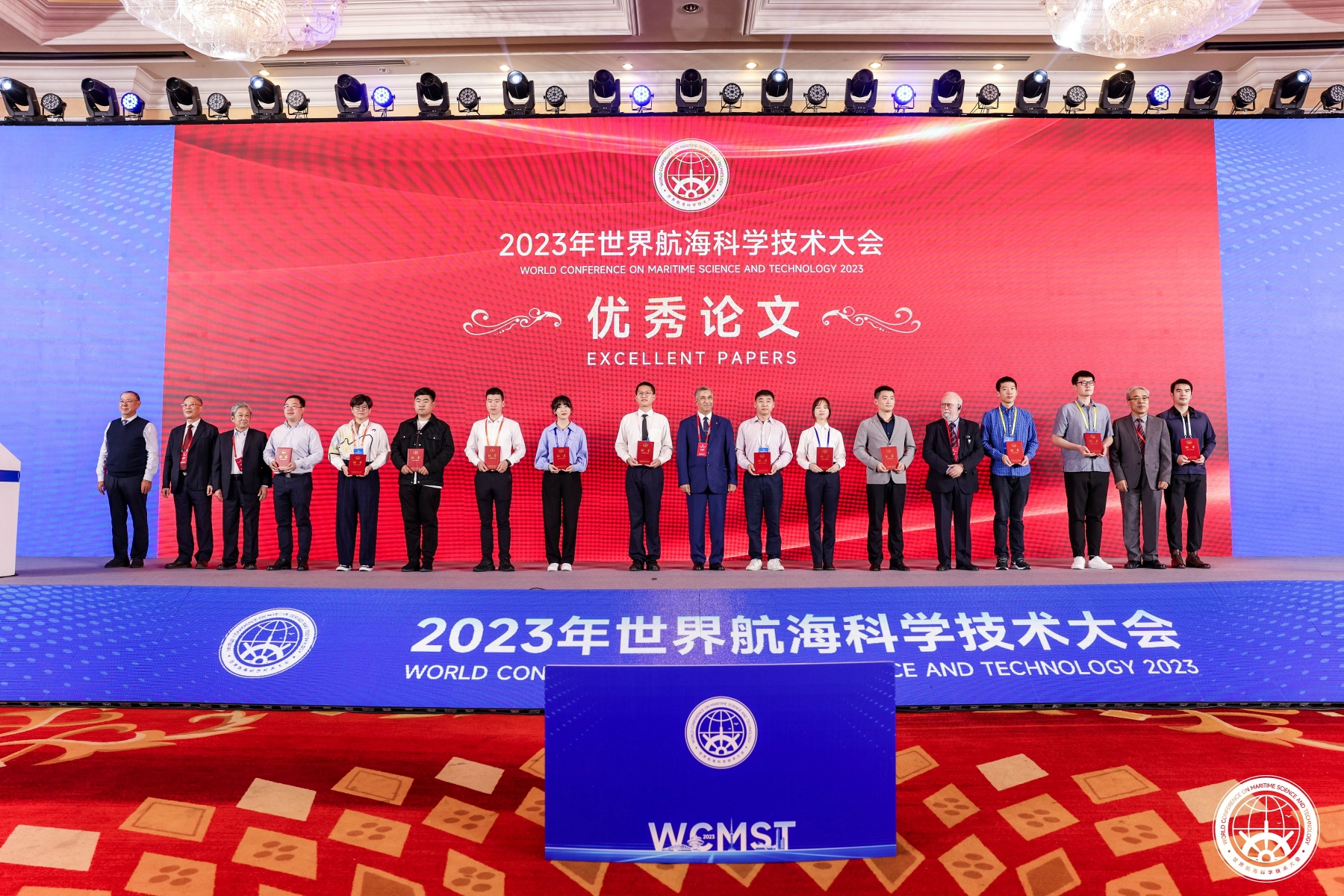
Issue the certificates of good paper
The Academic Committee of the conference selected the best and good papers, and carried out academic exchanges in four sessions, including Autonomous Ships and Nautical Security, Intelligent Ports, Intelligent Shipping and Safety, and Intelligent Shipping and Sustainable Development.
